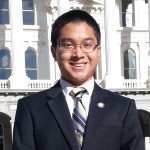With the new academic year arriving, the Daily Bruin sat down with Jefferson Kuoch-Seng, the incoming president of the University of California Student Association, to hear more about the association’s plan for the year.
UCSA selected Kuoch-Seng, a fourth-year management student from UC Merced, as its president for the 2014-2015 year during its annual congress in August.
Kuoch-Seng, who has served as the Associated Students of UC Merced external vice president since 2013, is the first UCSA president to come from the campus. ASUCM’s external vice president and UC Merced Graduate Student Association’s external affairs officer have served as members on the UCSA Board of Directors.
UCSA advocates for students on various issues, such as college affordability and diversity. As president, Kuoch-Seng serves as an official representative and spokesman for the organization in events such as UC Board of Regents meetings. He is also tasked with maintaining communication with administrators such as chancellors, regents and the UC president as well as other student advocacy groups, such as the United States Student Association.
Daily Bruin: For the first time this year, the UCSA Student of Color Conference is set to be held at UC Merced. The UCSA president is also from UC Merced for the first time. As the association’s president, how do you hope to utilize your position to incorporate UC Merced more into UCSA’s work?
Jefferson Kuoch-Seng: One of my biggest goals as an external vice president from UC Merced has been to make it known that we are not a small campus and that we have potential. The potential hasn’t really been unlocked yet.
We are not at the scale of UCLA and UC Berkeley in terms of how much involvement our students have with grassroots efforts, so we really hope to get (UC Merced) to become like campuses such as UC Berkeley, where it has a student activist movement.
In the Student of Color Conference this year, we want to have students from UC Merced meet other students on other UC campuses so we have a coalition.
DB: Can you elaborate a little more on how you want to utilize the Student of Color Conference?
JK: We have more than 40 cultural organizations at UC Merced. At our campus, there is a disconnect between (student) organizations. Something we would really like to have in order to foster an inclusive community is (for) students at the campus to meet with other students. Intercultural education is something we don’t have, but it’s something we need.
DB: How do you plan to work with sexual assault survivors and advocates for UConsent, a campaign from UCSA to address sexual violence on campuses?
JK: The best way is through communication. UCSA has a legislative committee to work with. It has a campus committee to work with. So, UCSA will help incorporate survivors and advocates into a conversation with the UC Office of the President, UC regents and other administrative groups. Right now, not enough students are meeting with the UCOP.
DB: What is the biggest challenge facing the UC right now?
JK: It’s the same as (it is) every year. It’s just money. We are potentially seeing a tuition increase next year. Looking at the UC’s budget and the amount of money the UC is receiving from the state, it looks obvious that the burden would fall under students to pay the shortfall.
The money that is going toward the (pension and retirement programs for UC employees) is a mandatory cost. That’s something that will be paid first, so that leaves our quality of education and affordability of education on the line. The UC will have to yield the funding to those costs before (giving it to) students. The shortfall is something that students will have to foot.
Our main job this year is to secure a tuition freeze and rollbacks for next year.
DB: There has been a big debate about whether the UC has been enrolling too many nonresidents. What are your thoughts on the subject?
JK: For each nonresident enrollment, it pays for two in-state students. So, it’s both good and bad. We want the UC for California. But at the same time, if California isn’t able to meet the UC’s needs, there is going to be an alternative.
Compiled by Jeong Park, Bruin senior staff.
